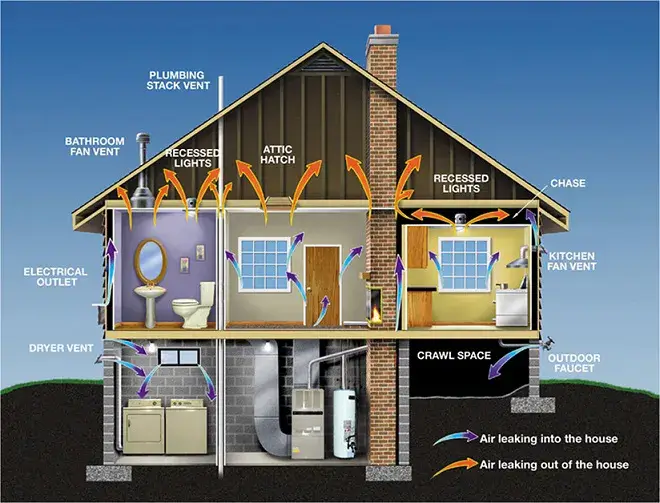In today’s world, energy efficiency is more important than ever. As concerns over climate change and rising energy costs continue to grow, individuals and businesses are increasingly looking for ways to reduce their energy usage and lower their carbon footprint. One key tool in this effort is an energy audit, a comprehensive assessment of a building’s energy usage and potential areas for improvement. In this ultimate guide, we will explore everything you need to know about energy audits in Brooklyn.
Understanding the Basics of Energy Audit

What is an Energy Audit?
An energy audit is a systematic evaluation of a building’s energy consumption, efficiency, and potential areas for improvement. It involves a detailed analysis of the building’s energy usage, including its heating, cooling, lighting, and appliance systems. The goal of an energy audit is to identify energy inefficiencies and provide recommendations for energy-saving measures.
Importance of Energy Audit
Energy audits are instrumental in helping individuals and businesses understand their energy usage patterns, identify inefficiencies, and create a roadmap for energy savings. By conducting an energy audit, you can gain valuable insights into reducing your energy consumption, lowering your energy bills, and contributing to a sustainable future.
The Process of Energy Audit
The energy audit process typically involves several steps. Firstly, an energy auditor will thoroughly inspect the building, collecting data on energy usage, building structure, and equipment. This may include analyzing utility bills, conducting interviews with occupants, and using specialized tools to measure energy consumption.
The energy auditor will carefully examine the building’s heating and cooling systems during the inspection. They will assess the condition of the HVAC equipment, check for any leaks in the ductwork, and evaluate the system’s overall efficiency. Additionally, they will inspect the lighting fixtures to identify any outdated or inefficient bulbs contributing to unnecessary energy consumption.
Secondly, the auditor will analyze the collected data and identify areas where energy inefficiencies exist. These may include outdated equipment, air leaks, insufficient insulation, or inefficient HVAC systems. The audit report will provide a detailed breakdown of findings and recommendations for energy-saving measures.
Furthermore, the energy auditor will assess the building’s insulation levels. They will inspect the walls, ceilings, and floors to determine if there are any gaps or areas where heat transfer may occur. By identifying these areas, the auditor can recommend insulation upgrades to improve energy efficiency and reduce heat loss.
Lastly, the energy auditor will work with the building owner or manager to implement the recommended energy efficiency improvements. This may involve upgrading equipment, sealing air leaks, improving insulation, or adopting energy-efficient lighting solutions. The auditor will provide guidance on the most cost-effective measures and help prioritize the implementation process.
It is important to note that energy audits are not a one-time event. Buildings and energy systems evolve over time, and regular audits can help ensure that energy efficiency measures are maintained and new opportunities for savings are identified. By periodically conducting energy audits, individuals and businesses can continue to optimize their energy usage and contribute to a greener and more sustainable future.
The Role of Energy Auditors in Brooklyn
Energy auditors play a crucial role in Brooklyn’s efforts to promote energy efficiency and sustainability. These professionals are responsible for assessing the energy usage of buildings and identifying opportunities for improvement. By conducting thorough audits, energy auditors help property owners and managers reduce energy consumption, lower utility costs, and minimize environmental impact.
Qualifications of a Professional Energy Auditor
Becoming a professional energy auditor in Brooklyn requires a combination of technical knowledge, experience, and certifications. These qualifications ensure that auditors have the necessary skills to perform accurate assessments and provide valuable recommendations. In addition to a strong understanding of building science and energy efficiency technologies, auditors must stay up-to-date with the latest industry standards and best practices.

One of the indicators of a qualified energy auditor is certification. Certifications such as Certified Energy Manager (CEM) or Building Performance Institute (BPI) demonstrate that an auditor has met rigorous standards and possesses the necessary expertise. These certifications require auditors to pass exams that assess their knowledge of energy management principles, energy auditing techniques, and building systems.
Furthermore, professional energy auditors often have practical experience in the field. This hands-on experience allows them to apply their knowledge in real-world scenarios and understand the unique challenges and opportunities that different buildings present. By combining theoretical knowledge with practical skills, auditors can provide comprehensive and effective energy audits.
Responsibilities of an Energy Auditor
An energy auditor’s primary responsibility is to conduct a comprehensive assessment of a building’s energy usage and identify areas for improvement. This involves a multi-step process that requires attention to detail and a thorough understanding of energy systems.
The first step in the auditing process is analyzing utility data. Energy auditors review historical energy bills and analyze patterns and trends in energy consumption. This data provides valuable insights into a building’s energy usage and helps auditors identify potential areas of inefficiency.
Once the utility data has been analyzed, auditors perform on-site inspections. This involves visiting the building and conducting a thorough examination of its energy systems, including HVAC systems, lighting, insulation, and appliances. Auditors use specialized tools and equipment to measure energy consumption and identify any issues or inefficiencies.
After gathering all the necessary data, energy auditors analyze their findings and prepare a comprehensive report. This report includes a detailed assessment of the building’s energy performance, highlighting areas of improvement and providing recommendations for energy-saving measures. These recommendations can range from simple behavioral changes to more complex retrofitting projects.
Effective communication is a crucial skill for energy auditors. They must be able to clearly explain their findings and recommendations to clients, ensuring that they understand the potential benefits of implementing energy-saving measures. Additionally, auditors may assist clients in accessing available incentives and rebates to offset the costs of energy efficiency upgrades.
In conclusion, energy auditors in Brooklyn play a vital role in promoting energy efficiency and sustainability. Through their qualifications, experience, and expertise, they help identify opportunities for energy savings and provide valuable recommendations to property owners and managers. By implementing these recommendations, buildings can reduce their environmental impact, lower utility costs, and contribute to a more sustainable future.
Preparing for an Energy Audit in Brooklyn
Are you considering an energy audit for your building in Brooklyn? Taking steps to improve energy efficiency can not only reduce your carbon footprint but also save you money on utility bills. Before you schedule an energy audit, it’s important to be prepared. Here are some steps you can take to ensure a smooth and productive audit process.
Steps to Take Before the Audit
Prior to the energy audit, there are several steps you can take to prepare your building. Start by collecting utility bills for the past year to provide the auditor with a comprehensive energy usage history. This information will help the auditor identify any patterns or trends in your energy consumption.
Additionally, gather any available documentation of the building’s construction, including floor plans and insulation specifications. This will give the auditor a better understanding of the building’s layout and materials used. Finally, make a list of any specific concerns or areas of focus that you would like the energy auditor to address. Whether it’s drafty windows, outdated HVAC systems, or inefficient lighting, providing the auditor with this information will help them tailor their assessment to your needs.
What to Expect During the Audit
During the energy audit, the auditor will conduct a detailed inspection of your building. They will carefully examine various aspects of your property to identify areas where energy efficiency can be improved. One of the tools they may use is thermal imaging cameras, which can detect air leaks and insulation gaps that are not visible to the naked eye. By pinpointing these areas, the auditor can recommend appropriate measures to address them.
In addition to thermal imaging, the auditor will also measure the efficiency of your heating and cooling systems. They will assess the performance of your HVAC equipment, ensuring that it is operating optimally and not wasting energy. Lighting and appliance usage will also be analyzed to identify any opportunities for energy savings. By examining your energy-consuming devices, the auditor can suggest more efficient alternatives or behavioral changes that can lead to significant energy reduction.
Furthermore, the auditor may conduct blower door tests to assess the overall airtightness of your building. This test involves creating a pressure difference between the inside and outside of the building and measuring the air leakage. By identifying areas of energy loss, such as gaps around windows and doors, the auditor can recommend sealing and insulation measures to improve the building’s energy efficiency.
It’s important to note that the duration of the energy audit can vary depending on the size and complexity of the building. For smaller properties, the process may take a few hours, while larger or more intricate structures may require multiple days to complete the assessment thoroughly. The auditor will ensure that no stone is left unturned in their quest to identify energy-saving opportunities for your building.
Interpreting Your Energy Audit Results
Understanding Your Energy Usage
After the energy audit is complete, you will receive a detailed report outlining your building’s energy usage and potential areas for improvement. This report will help you understand how energy is being consumed in your building and identify which systems or equipment are contributing the most to your energy bills.
Identifying Energy Efficiency Opportunities
The audit report will also provide recommendations for energy-saving measures. These can range from low-cost adjustments, such as installing programmable thermostats or upgrading lighting fixtures, to more significant investments, such as replacing outdated HVAC systems or improving insulation. It’s essential to carefully review the recommendations and prioritize based on cost, potential energy savings, and the overall impact on your building’s energy efficiency.
Implementing Energy Efficiency Measures
Prioritizing Energy Efficiency Improvements
Once you have reviewed the energy audit report and identified potential energy-saving measures, it’s essential to prioritize their implementation. Consider factors such as the estimated energy savings, payback period, and the overall impact on your building’s comfort and functionality. Some improvements may require upfront investment but can result in significant long-term energy savings.
Cost and Benefits of Energy Efficiency Measures
Before implementing energy efficiency measures, it’s crucial to evaluate their costs and benefits. Calculate the potential energy savings, taking into account factors such as the current energy prices and the expected lifespan of the equipment or upgrades. Additionally, explore available incentives, tax credits, or grants that can help offset the initial costs of energy efficiency improvements.
By undertaking an energy audit and implementing energy efficiency measures, individuals and businesses in Brooklyn can make a significant impact on reducing energy consumption and costs. Through a comprehensive assessment of your building’s energy usage and collaborations with professional energy auditors, you can pave the way for a more sustainable and energy-efficient future.





